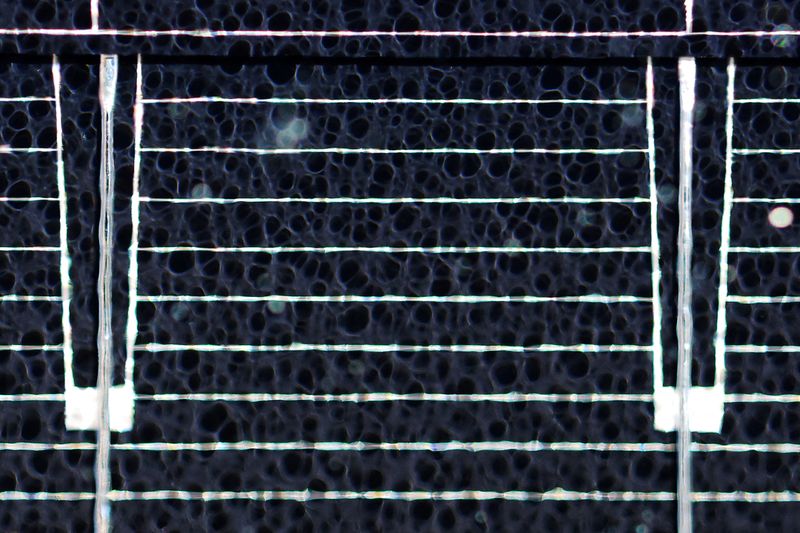By Nichola Groom and Jarrett Renshaw
(Reuters) -The Biden administration is expected to grant a request by South Korea’s Hanwha Qcells to reverse a two-year-old trade exemption that has allowed imports of a dominant solar panel technology from China and other countries to avoid tariffs, two sources familiar with the White House plans said on Wednesday.
The news sent shares of solar manufacturers including U.S.-based First Solar (NASDAQ:FSLR) higher in afternoon trade.
The Qcells request, which has not previously been reported, comes as the company is seeking to protect a pledged $2.5 billion expansion of its U.S. solar manufacturing presence against competition from cheaper Asian-made products.
The solar division of Korean conglomerate Hanwha Corp outlined the request in a formal petition to the U.S. Trade Representative on Feb. 23. It included letters of support from seven other companies with billions of dollars combined invested in U.S. solar factories.
No decision has been made on the timeline of the expected reversal, the sources said.
Duties on imports of bifacial panels, the main technology in utility-scale solar projects, would be a boon to the more than 40 solar equipment factories planned since U.S. President Joe Biden signed his landmark climate change law, the Inflation Reduction Act, in 2022.
Those plants are critical to Biden's plan to fight climate change, revitalize American manufacturing and create millions of union jobs.
Past trade remedies have sharply divided the U.S. solar industry, which is dominated by installers and developers who rely on cheap imports to keep their project costs low.
The top U.S. solar trade group, the Solar Energy Industries Association (SEIA), lobbied for the bifacial exemption.
In a statement, SEIA did not address the exemption directly but advocated for an increase in the amount of solar cells that can be imported tariff-free to help companies assembling American-made panels.
"We hope the Administration is prepared to directly support increased domestic manufacturing of solar modules by raising the tariff rate quota on cells," said Stacy Ettinger, SEIA's senior vice president of supply chain and trade.
Biden administration officials, including Treasury Secretary Janet Yellen and U.S. Trade Representative Katherine Tai, in recent weeks have said the U.S. is evaluating trade remedies to deal with threats posed by China's massive investment in factory capacity for clean energy goods.
The solar panel issue goes to the core of one of Biden’s arguments for re-election: that his economic policies have begun transforming the U.S. energy economy while combating climate change. However, the pace of growth in the domestic solar panel manufacturing market has been cast into doubt by surging imports of cheap, Chinese panels.
A bipartisan group of U.S. senators, led by the two Democrats from the critical election battleground state of Georgia, asked Biden earlier this year to toughen up tariffs on Chinese solar panels or face a glutted market just as clean-energy tax credits hit the market.
Qcells, which has two factories in Georgia, is the largest U.S. producer of silicon-based solar products.
In its petition, a copy of which was seen by Reuters, the company asked Biden to revoke an exemption of so-called bifacial panels from duties first imposed by Republican former President Donald Trump in 2018 and extended by Biden, a Democrat, in 2022.
The tariffs on imported modules started at 30% and currently stand at 14.25%. They are due to expire in 2026.
'A LEVEL PLAYING FIELD'
Most panel imports come from Southeast Asia but are made by Chinese companies there.
The U.S. imposed duties on some panel makers for finishing their products in Cambodia, Malaysia, Thailand and Vietnam to avoid tariffs on Chinese-made goods. Biden waived those tariffs nearly two years ago, a policy that the White House said it will allow to expire in June.
"We're continuing to look at all of our options to ensure that the historic investments spurred by the Inflation Reduction Act are successful," a White House official said. "Our companies and workers can compete with anyone, but they need a level playing field."
Bifacial panels can generate electricity on both sides. The technology was nascent when the tariffs were first imposed but now accounts for 98% of imported modules, according to the petition.
The action is needed, Qcells said in the petition, to preserve the many plans for new U.S. solar manufacturing capacity that have been unleashed by incentives contained in the IRA.
"Despite these positive trends, there is growing evidence that negative market conditions caused by surging imports of bifacial modules are causing several companies to rethink their plans to invest in the U.S.," the petition said.
Qcells' request is supported by seven other solar manufacturers with U.S. factories - First Solar, Heliene, Suniva, Silfab, Crossroads Solar, Mission Solar and Auxin Solar - according to the petition documents.
First Solar shares closed nearly 3% higher at $178.01 on the Nasdaq.
